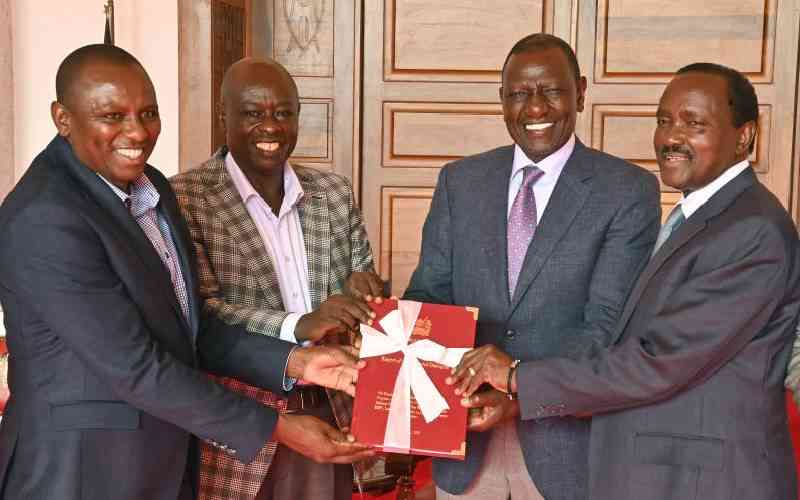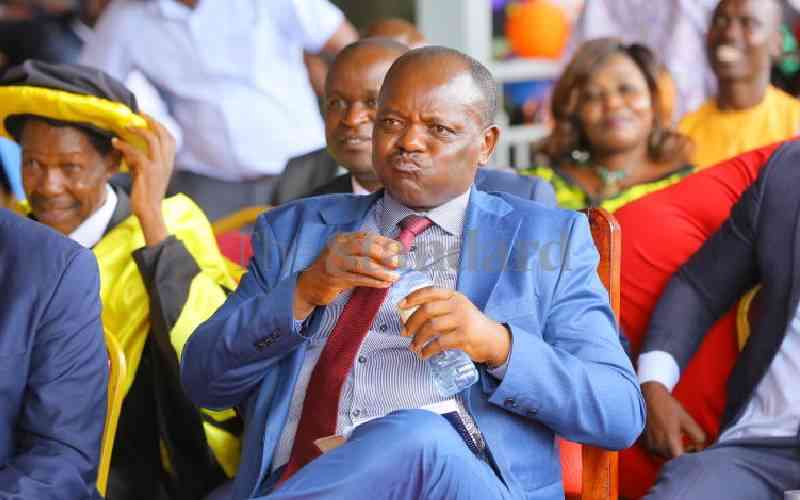You then consider the merits of each candidate and cast your vote. Thereafter, you leave to await the outcome away from the polling station. On paper, the process appears fairly simple and straightforward.
But pause for a moment and consider the election from a broader perspective. Think of a fairly simple polling station - only one stream, two members of staff, one security person, six ballot boxes, 1,500 ballot papers and 248 registered voters.
The vehicle supplying the polling station arrived at the constituency warehouse around 10pm last night to gather the election materials.
The truck was loaded with around 100kg of materials by another set of workers and departed at 2am to cover the 62km of bad road to reach the polling station.
The driver and the clerk do not work for free. For the clerk, training was necessary, which created a need for trainers and training materials. An accounts team handled all of the finance details required to pay the employees; a human resources department sorted out the hiring and contractual details.
In addition to staff, elections require materials: ink, ballot papers, twine, lamps, pens, ballot boxes, stamps, airtime, calculators, signage, batteries, legal forms, voter registers, electronic voter identification machines, results transmission equipment and so on. All this must be anticipated, sourced, procured and distributed to make the polling station functional on election day.
Multiply this organisational feat by the number of polling stations in Kenya, estimated to be 44,000 by the 2017 elections, and you begin to appreciate that a general election is a logistical feat.
While ballot counting may be formulaic, electoral administration and logistics are not. Organising transport in Karatina involves different challenges than in Kilgoris. Finding a secure warehouse near Rumuruti requires different knowledge than in Rangwe.
A successful election requires thousands of decisions – small and large, local and national – made over the course of several years by hundreds of technocrats. Given how most of us experience a general election, it is easy to forget the complexity of the process.
There may well be plausible causes for dissolving the Independent and Electoral Boundaries Commission (IEBC). There have even been suggestions that the secretariat itself should be disbanded and staff vetted afresh. This argument in favour of a blanket removal and/or fresh vetting is one that should concern us all.
First, let us look at the logical dates and sequences of such an action. Going by the happenings in Parliament, we can’t tell when a new, fully constituted commission will be in place.
This means that if we disband and/or opt to vet secretariat staff, the earliest we could have a semblance of a functioning team would be January 2017, and this presumes no one goes to court to challenge the removal or vetting.
Second, a new secretariat will be no more insulated from political bias than the current one, and its inexperience may make it especially vulnerable to manipulation.
Third, dissolving the IEBC secretariat effectively destroys institutional knowledge built since 2011, scattering a legion of experienced technocrats to the wind.
Stay informed. Subscribe to our newsletter
Fourth, dissolution by political consensus – rather than specific legal action – simply perpetuates the game of political football faced by Kenyan electoral commissions since the 1990s.
These last two points have implications for future electoral commissions; Kenya cannot hope to attract its most talented citizens to constitute the electoral commission if those secretariat employees remain under constant threat of dismissal when the political winds change.
While the political debate on the future of the IEBC secretariat rages on, the practical implications of dissolving the secretariat are clear. In a best-case scenario, a new secretariat – almost 1,000 inexperienced staff – would not likely start work until January 2017, with politically negotiated commissioners taking office in late December 2016.
A new secretariat would be ill prepared and too inexperienced to face the thousands of decisions that need to be made in light of a general election looming just seven months away.
As the (Justice Johann) Kriegler Report recommends, “A fully composed commission should be in office for two years prior to the conduct of general or presidential elections.”
While dissolving the IEBC now is a risk we can take, taking a shot at the secretariat exposes us to past mistakes.
 The Standard Group Plc is a
multi-media organization with investments in media platforms spanning newspaper
print operations, television, radio broadcasting, digital and online services. The
Standard Group is recognized as a leading multi-media house in Kenya with a key
influence in matters of national and international interest.
The Standard Group Plc is a
multi-media organization with investments in media platforms spanning newspaper
print operations, television, radio broadcasting, digital and online services. The
Standard Group is recognized as a leading multi-media house in Kenya with a key
influence in matters of national and international interest.
 The Standard Group Plc is a
multi-media organization with investments in media platforms spanning newspaper
print operations, television, radio broadcasting, digital and online services. The
Standard Group is recognized as a leading multi-media house in Kenya with a key
influence in matters of national and international interest.
The Standard Group Plc is a
multi-media organization with investments in media platforms spanning newspaper
print operations, television, radio broadcasting, digital and online services. The
Standard Group is recognized as a leading multi-media house in Kenya with a key
influence in matters of national and international interest.







